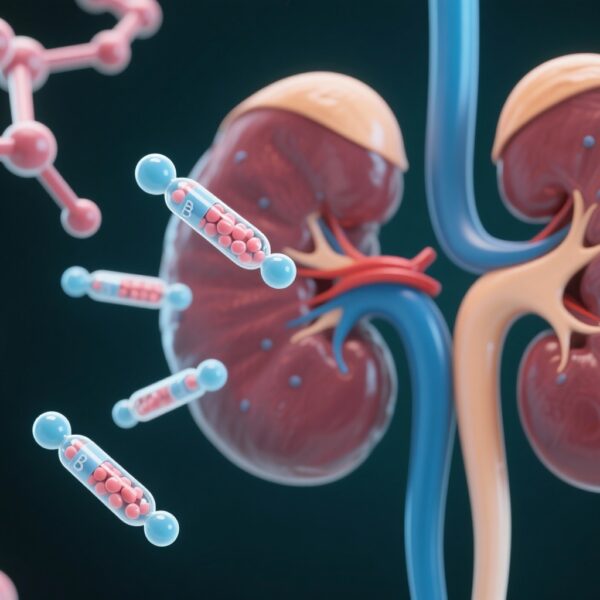Highlight
Celcuity announces positive phase 3 VIKTORIA-1 trial results for gedatolisib, a pan-PI3K/mTORC1/2 inhibitor, in HR+/HER2- advanced breast cancer patients progressing after CDK4/6 inhibitor and aromatase inhibitor therapy. The drug notably extends progression-free survival (PFS) and improves objective response rates in PIK3CA wild-type (WT) subgroups. Based on these findings, a new drug application (NDA) rolling submission has been initiated.
Study Background
Hormone receptor-positive (HR+), HER2-negative advanced breast cancer (ABC) constitutes a significant subtype of breast cancer with substantial morbidity and mortality worldwide. Despite advances such as CDK4/6 inhibitors combined with endocrine therapy (e.g., aromatase inhibitors or fulvestrant), disease progression inevitably occurs, highlighting an unmet need for effective subsequent-line therapies. Alterations in the PI3K/AKT/mTOR pathway contribute to endocrine resistance and cancer progression; however, approved PI3K inhibitors predominantly target PIK3CA-mutated tumors, leaving limited options for PIK3CA wild-type patients.
Study Design
The ongoing phase 3 VIKTORIA-1 clinical trial conducted by Celcuity evaluates gedatolisib—a novel oral, broad-spectrum small molecule inhibitor targeting PI3K isoforms and mTOR complexes 1 and 2. The study enrolled patients with HR+/HER2- advanced breast cancer who experienced disease progression following prior treatment with CDK4/6 inhibitors and aromatase inhibitors. Patients were randomized to receive either a triple combination of gedatolisib, palbociclib (a CDK4/6 inhibitor), and fulvestrant, or a doublet of gedatolisib plus fulvestrant, compared against an active control regimen.
Key endpoints included progression-free survival (PFS), objective response rate (ORR), duration of response (DOR), and safety. Subgroup analyses specifically assessed efficacy in PIK3CA wild-type (WT) patients, a population with substantial unmet therapeutic needs.
Key Findings
In PIK3CA WT patients, the triple combination regimen (gedatolisib plus palbociclib and fulvestrant) significantly reduced the risk of disease progression or death by 76% compared to the active control (hazard ratio [HR]=0.24; 95% confidence interval [CI]: 0.17–0.35; p < 0.0001). Median PFS reached 9.3 months versus 2.0 months for the control group, representing a clinically meaningful extension of 7.3 months. The ORR was 31.5%, with a median duration of response (DOR) of 17.5 months.
The doublet of gedatolisib plus fulvestrant also demonstrated robust efficacy, reducing disease progression or death risk by 67% (HR=0.33; 95% CI: 0.24–0.48; p < 0.0001) compared with active control. Median PFS was 7.4 months versus 2.0 months in the control arm, translating into a 5.4-month improvement. The ORR in this group was 28.3%, with median DOR of 12.0 months, whereas the control arm had insufficient responders to properly estimate DOR.
These results underscore the potential of gedatolisib as the first PI3K/AKT/mTOR pathway inhibitor to achieve substantial clinical benefit in HR+/HER2-/PIK3CA WT patients progressing after CDK4/6 inhibitor therapy, a challenging population with limited therapeutic options.
Regarding safety, no new safety signals were reported. The tolerability profile aligned with expectations for PI3K/mTOR pathway inhibition, supporting the feasibility of combined use with endocrine and CDK4/6 inhibitors in this patient cohort.
Expert Commentary
These phase 3 results position gedatolisib as a promising therapeutic advancement in a heavily pretreated HR+/HER2- advanced breast cancer population, particularly addressing the PIK3CA WT subgroup often excluded or underserved by current PI3K-targeting agents focused on mutation-positive disease. The substantial gains in PFS and response durability offer hope for improved long-term disease control following progression on standard-of-care CDK4/6 inhibitors plus endocrine therapy.
However, further examination in larger populations and longer follow-up is warranted to clarify overall survival impact and long-term safety. It will also be critical to validate biomarkers predictive of response to optimize patient selection. The rolling NDA submission by Celcuity may expedite regulatory review and, if approved, fulfill a significant unmet need.
Conclusion
Celcuity’s broad-spectrum PI3K/mTORC1/2 inhibitor gedatolisib demonstrates compelling efficacy and manageable safety in phase 3 VIKTORIA-1 study for HR+/HER2- advanced breast cancer patients with PIK3CA wild-type tumors previously treated with CDK4/6 inhibitors and aromatase inhibitors. Both triple and doublet regimens significantly improved progression-free survival and response rates versus active control. These results represent a new therapeutic option for this difficult-to-treat subgroup and support the ongoing new drug application process.
These findings highlight the importance of targeting the PI3K/AKT/mTOR pathway broadly beyond PIK3CA mutations, potentially reshaping treatment paradigms in endocrine therapy-resistant advanced breast cancer.
Funding and ClinicalTrials.gov
The VIKTORIA-1 trial is sponsored by Celcuity. Clinical trial registration details have not been specified in the public press release. Further inquiry to official trial registries and Celcuity disclosures is recommended for comprehensive trial information.
References
Celcuity Press Release. Celcuity Provides Update on Status of the PIK3CA Mutated Cohort of Phase 3 VIKTORIA-1 Trial and Releases Additional Data Analysis From Phase 1b Clinical Trial. October 18, 2025. Available at: https://ir.celcuity.com/press-releases/
Andre F, Ciruelos E, Rubovszky G, et al. Alpelisib for PIK3CA-Mutated, Hormone Receptor–Positive Advanced Breast Cancer. N Engl J Med. 2019;380(20):1929-1940.
Moreno Garcia V, Toska E, et al. PI3K/AKT/mTOR targeting in breast cancer: Novel therapies and mechanisms of resistance. Crit Rev Oncol Hematol. 2021;157:103182.



